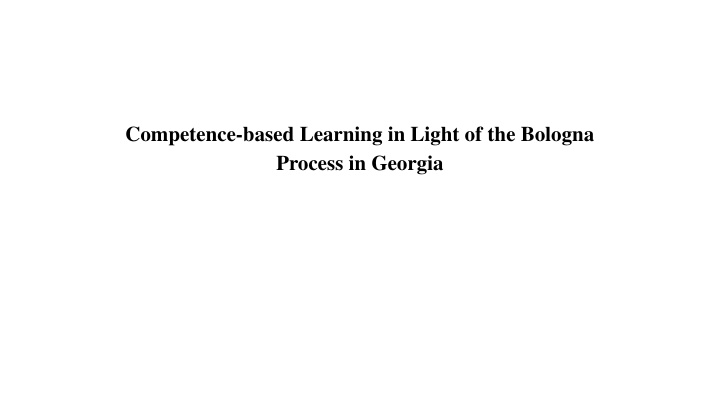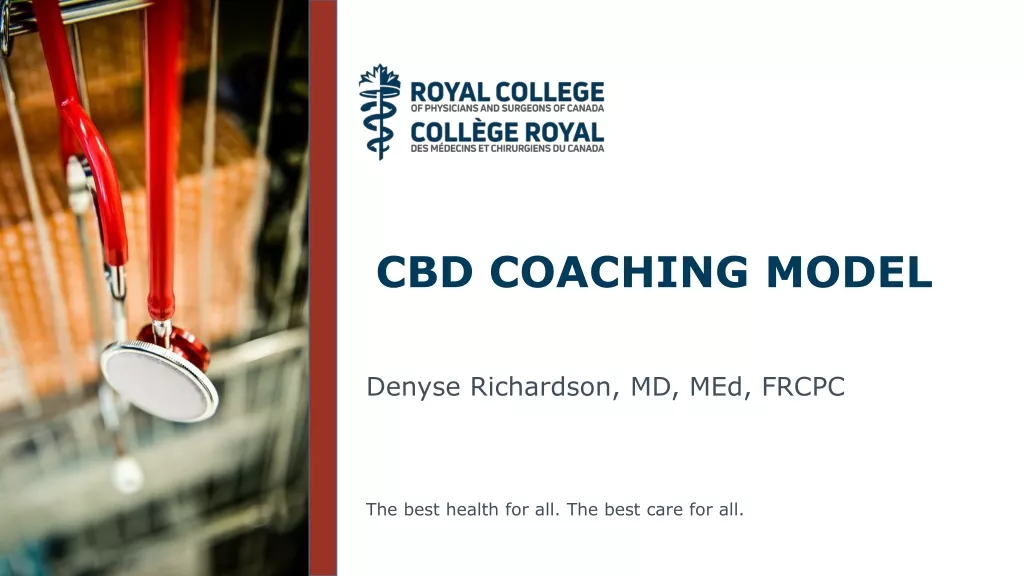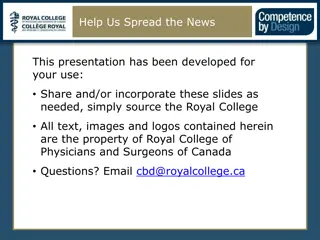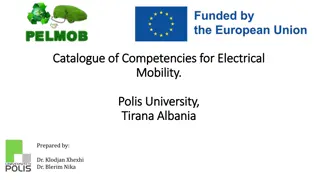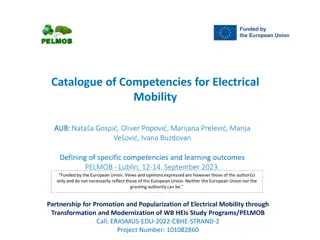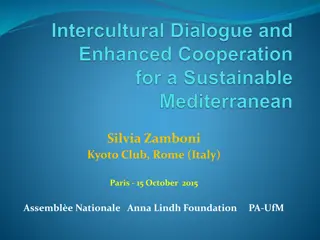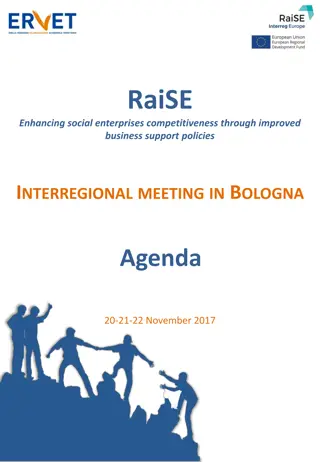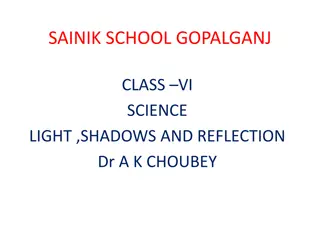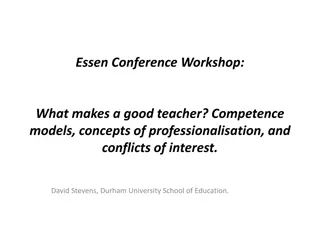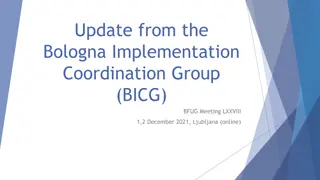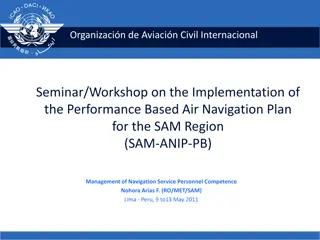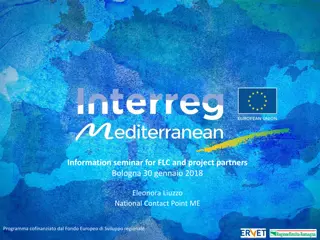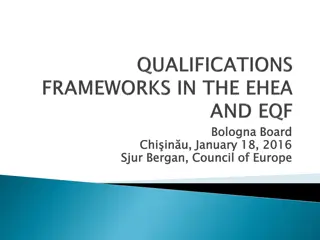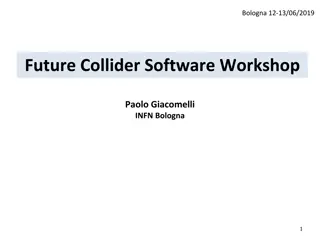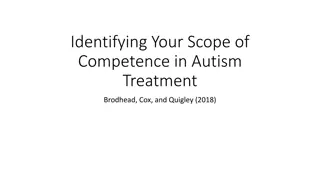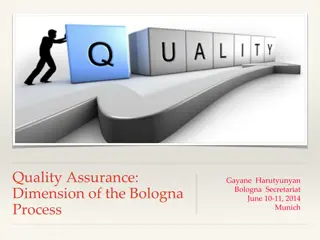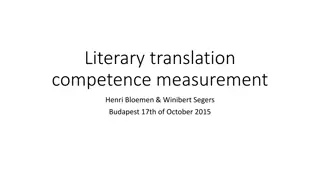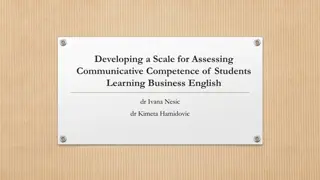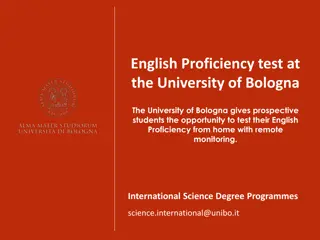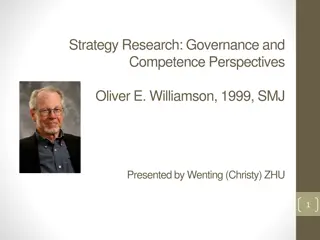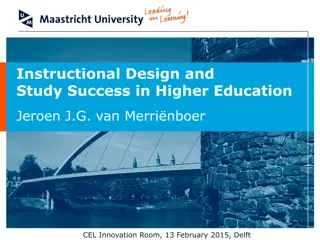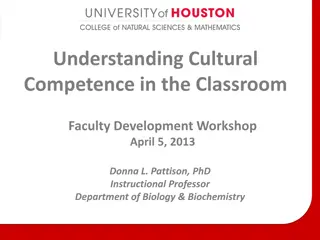Competence-Based Learning in Light of the Bologna Process
The research aims to identify deficiencies in educational programs in Georgia and provide recommendations for improving competence-based learning in higher education institutions. Focus is on building competences essential for competitiveness in the job market.
Uploaded on Apr 04, 2025 | 1 Views
Download Presentation

Please find below an Image/Link to download the presentation.
The content on the website is provided AS IS for your information and personal use only. It may not be sold, licensed, or shared on other websites without obtaining consent from the author.If you encounter any issues during the download, it is possible that the publisher has removed the file from their server.
You are allowed to download the files provided on this website for personal or commercial use, subject to the condition that they are used lawfully. All files are the property of their respective owners.
The content on the website is provided AS IS for your information and personal use only. It may not be sold, licensed, or shared on other websites without obtaining consent from the author.
E N D
Presentation Transcript
Competence-based Learning in Light of the Bologna Process in Georgia
Authors: Turmanidze L. Associate Professor; Dean of the Faculty of Exact Sciences and Education Mazmishvili N.-Assistant Professor at the Department of European Studies
The objective of the presented research is to identify the typical deficiencies in the educational programmes and the related syllabi at higher education institutions in Georgia with the main focus to detect those gaps that create difficulties in building generic or specific competences in the graduates.
Outcomes Outcomes The outcomes of the research are targeted to reveal the most common discrepancies in the educational programmes and the syllabi to detect the main constraints causing failure in provision of so called Competence-based Learning in higher education institutions to work out the recommendations on the immediate remedial measures
General findings General findings The findings of the given paper demonstrate the need of awareness in the Philosophy of competence-based learning and the main pillars of the concept the correct development of which can truly contribute to building the competences and skills necessary for the graduate of the educational programmes to be competitive on the current labor market.
Introduction 21stcentury education sets new challenges in terms of skills and competences that could enable the citizen of the 21stcentury to compete on the labor market and contribute to the development of the country and the world in general. Independence, constructive thinking, collaboration, creativity besides other specific skills gained more value than ever what is conditioned by the high level of competitiveness on the labor market.
Due to the mentioned universities have to make sure that the educational programmes together with study courses build those competences that ensure dealing with real-life situations for the graduates The map of competences and syllabi must be the ground, on the basis of what delivery of knowledge, development as well as transparent measurement of the generic and specific skills can be ensured Syllabi of the educational programmes are responsible for provision not only the staying-on-the paper competences, but allow the graduates to acquire competences as well as measure the real potential of their own achievement
While talking about the education of the 21stcentury, the key term the stakeholders comes across with in all manuals and guidelines is Competence-based learning the realization of what is the responsibility of the higher education institutions and all stakeholders in general. Sanchez et al. (2008, p.18) state that in order to function and integrate successfully into the society and working place, people need to acquire certain instrumental, interpersonal and systemic skills and abilities. These competences are therefore crucial to university degree programmes which, in addition to requiring mastery of an academic specialty, also incorporate a broad range of competences designed to enrich the student s personal life and career .
Accelerated development of technologies together with the high speed of globalization and internationalization created even more challenges for the system of education. As Sanchez et.al. (2008, p.31) say The second half of this century will go down in the history of higher education as the period of its most spectacular expansion: an over six-fold increase in student enrolments worldwide, from 13 million in 1960 to 82 million in 1995; But it is also the period which has seen the gap between industrially developed, the developing countries and in particular the least developed countries with regard to access and resources for higher learning and research, already enormous, becoming even wider. It has also been a period of increased socio-economic stratification and greater difference in educational opportunity within countries...
We can see in this text the great paradox of our time. The more developed and wide-spread that higher education is, the wider the gap between rich countries and poor. That is, the greater the progress in science, knowledge, research and technology, the greater the difference between the developed and developing countries, not to mention in the least-developed ones. This means that progress in science and knowledge is not distributed fairly. Not only are differences not reduced, but in fact they increase and get worse (Sanchez, Ruiz, Olalla, Mora, Paredes, Otero, Ildefonso, Eizaguirre, 2008, p. 31). Initiation of the Bologna Process was the practical step that served as the light in the quite confused period, which helped many countries to understand the complexity as well as the needs of reality
Due to the mentioned reasons, Georgian educators had and still have to face numerous challenges to get the Georgian education system back to the right track and even more, make a successful converge of the strong sides of the old, traditional education, the current reality and the EU standards that tend to be the requirement not only in the system of education but all other fields of the life. Despite the fact that Georgia is closely following the development of the education system in the light of the Bologna Process and professors and other stakeholders are truly open and ready to provide their input in terms of making Georgian education system fully comply with EU standards, there is still quite some work to be done in terms of meeting the needs in the context of the competence-based learning as this is observed to be the key target of all stakeholders in the education.
The incentive for the given research is the existing reality in the country, that turns out to be demanding towards the competences and skills despite the lack of the employment potential on the local labor market. on the one hand, we speak about the low potential of employment in the country and on the other hand, insufficient knowledge and competences in the graduates to satisfy the employers.
One of the reasons of the existing problems is insufficient coordination between the industry and the system of education. Typical example could be the situation in the construction field; for example the largest-scale (in the country) water and waste water infrastructure construction project in Batumi, Autonomous Republic of Ajara (Black Sea Region in Georgia bothering Turkey on the North) is being implemented by the International consultant teams with the back-stopping experts the majority of whom are international too as, it is almost impossible to find a skillful engineer in Georgia (at least in the regions outside the capital) who could have the relevant competences in engineering to be able to follow international standards together with consideration of the environmental, social, health impact as well as occupational safety issues while doing his/her job. This is already the sign of the lack of specific competences in the concrete field.
One of the examples could be the incompliance between the level of the demand on the teacher of Physics on the labor market and the less and less school-leavers willing to study Physics. On top of that, the parents of the school pupils constantly complain about the Physics teacher of their kids being dissatisfied with the specific competences as well as the methodological approaches applied by the teacher.
Stakeholders in the field of Linguistics in Georgia have to become more alert on the importance of internationalization of the research in the field as the level of indexation and citation of international publications of the majority of the staff do not seem very much desirable so that we could be proud for the research topics and the results that could be of interest and value for the researchers worldwide.
Methodology Methodology Methodology we applied for our research comprises mainly in-depth analysis of the educational programmes in certain fields in Georgian universities as well as the observation of the processes of elaboration of the educational programmes/curriculums in the frame of the International Projects aimed at enhancement the capacity of the stakeholders in the system of education. Involvement in the International projects (for example MAHATMA- Master in higher education management: developing leaders for managing educational transformation) allowed the authors of the presented paper to get experience in international accreditation of educational programmes including the analysis of the programme, syllabi as well as participate in the interviews with the stakeholders from the industry.
The above mentioned allowed the authors of the research to analyze the documentation for approximately 100 educational programmes on the basis of 6 universities in Georgia. In order to keep the confidentiality and follow the ethics of academic relations, we decided not to mention the universities on the basis of which we collected the materials for our study. The results of the several-year evaluation, i.e. analysis of numerous educational programmes made it possible to get the real picture of the level the competence-based learning is being ensured in Georgian universities. The results of the work conducted within the task of the expert revealed those deficiencies that could be the potential part of the reasons of failure in building generic and specific competences in the graduates.
The main aspects that were focused while carrying out analysis of the educational programmes and the syllabi covered the main pillars of the competence-based learning approach which we put in parallel with the key principles of the four-sided pyramid of the Duesto University (Sanchez, Ruiz, Olalla, Mora, Paredes, Otero, Ildefonso, Eizaguirre, 2008, p. 21). So, the results of the research are based on the practical work carried out on the basis of the analysis of the available practical recourses as well as the data obtained from the students survey and professors being interviewed during the accreditation processes or the elaboration of the educational programmes.
The results of the research revealed not enough level of awareness of philosophy of the generic and the specific competences; syllabi show some blurred interface between the generic and the specific competences. Moreover, syllabi in some specialties revealed the lack of some important for the specialty competences such as Maths skills, for example, in the syllabi in the frame of the educational programmes in engineering field. Majority of syllabi are not clear enough about the way they are going to build interpersonal skills. This concerns the syllabi in Philological directions.
In many cases the professors overdo in terms of formulation of the competences and skills within one subject. In other words, the list of the competences goes beyond all possible limits of realization of the skills in the frame of one subject; The analysis of the syllabi also showed that similar competences and skills are repeated in several syllabi within one educational programme. Evaluation of the syllabi caused some suspicious of the experts towards the potential of building generic competences such as: independence, creativity, collaboration by the educational programme as there is no evidence that could prove building these skills.
Abig number of syllabi can not demonstrate any effective assessment tool through which the listed competences could be evaluated. For example, the so called values , one of the important principles of the pyramid mentioned earlier, is considered in every syllabi, however the analysis of these syllabi does not give any clear evidence that could ensure development of these values in the graduate of the educational programme; It must be stated that the questioners the students have to fill prove that many professors practically contribute to building those values in the students, the measures taken during the research revealed mainly professors performing in the field of languages as well as tourism, for example, apply for the teaching methodologies that serve to build the necessary skills such as: cooperation, constructive thinking, independence as the approaches they use obviously include role plays, project work, case study which truly play a huge role in preparation of the future citizen with acknowledgment of the social values and their own role in making decisions that can be only of a benefit to the society
The main ground of the issue is the lack of knowledge in methodological literature in the professors who practically contribute; the methodologies proposed in the syllabi of some professors do not comply with what they do in actual life as, neither interviews with them, nor the survey results confirm the realization of what is given in the paper, in real life. Insufficient acknowledgment of the proper didactics is also demonstrated by the long list of the methodologies in the syllabi out of which at least one third is appeared not to be understood properly by the author of the syllabus; The concept of group work is understood as just a technical format of the class organization.
Learning through the project, i.e. Project-based learning is understood as a simple task to the group that ends up in copying already existing materials from the internet resources due to what the students practically gain no skills except just collecting copied materials and briefing on them in front of the class; In some cases it even seems that the teaching/learning methods indicated in the syllabi are selected mechanically just to be sure they are on the paper. The in-depth study of the materials proved that the leaders of the educational programme/curriculum have to be more prepared to identify any discrepancies within the assessment means as assessment is the tool that makes is possible to measure the knowledge/competences gained through the study course.
The professors must know first, what is going to be assessed-which generic and specific competences the class has worked on; moreover indicators for the assessment of every component must be elaborated as they can provide evidence of progress; secondly, it is necessary to know how the competences are going to be assessed; in other words it is important to know what instruments will be used to assess the field related competences; the type of the assessment means should comply with the nature of the competence the students have to develop (Sanchez, Ruiz, Olalla, Mora, Paredes, Otero, Ildefonso, Eizaguirre, 2008, p. 42).
Approximately more than a half of the analyzed syllabi reflected incompliances between what is taught and what is measured. For example, many syllabi within different educational programmes state that the graduates will be able to prepare certain types of formal documents in the academic style keeping the rules of academic writing, however the list of the assessment tools proposed for the study course does not give any clear evidence that the development of the skill will be measured. Another example could be the assessment of the skill of fast decision making when no assessment means clearly shows the feasibility to assess it;
One of the most common aspects of incompliances in the syllabi was the lack of formative assessment means what is truly a necessary tool, together with summative assessment means, for the continuous/developmental progress. A very limited number of syllabi showed the application of the formative assessment means such as: self-evaluation report or progress report, diary, etc.;
Some deficiencies were also identified in selecting the assessment tools for the group work so that every person in the team is assessed fairly and transparently in accordance with his/her own contribution to the product the team creates. Thus, the need of awareness raising in setting a clear rubrics for the assessment of each student s contribution to the group work is also one of the issues to be addressed properly by the stakeholders in Georgia.
Recommendations Recommendations Experience showed that raising awareness in the necessity and the principle of competence-based learning is crucial; however, the lack of the relevant methodological literature in Georgian language can create obstacles to disseminate the knowledge as, the low or no competences in English do not allow the majority of stakeholders (especially those who worked in the Soviet period) to read and understand properly the related literature; therefore, the best and fastest solution could be the translation of the most important documentation in Georgian language.
Recommendations Recommendations More opportunities to share the experience and knowledge among the institutions on the regional as well as the international levels have to be ensured through national or international projects focused on building capacities of the representatives of higher education institutions. Even though the trainings and seminars or various workshops are conducted, these do not allow to achieve continuous learning and gain real competences to design student-centered curriculums; so, for the sustainable and continuous progress more and more stakeholders should be exposed to comprehensive and longer-term trainings or seminars focused on elaboration of educational programmes, application of the proper teaching/learning materials, selection of proper assessment means and other principles of competence-based learning.
Recommendations Recommendations Acceleration of the research in didactics in different fields should become one of the top issues on the agenda of the education in the country. Didactics, like every field of life, was deeply shaped by the ideology of the Soviet Union officials for decades. The educational programmes and the related aspects were simply directed from the center so that adjustment to the local needs was not considered at all. Consequently, what we need now, is to regain the research activities in didactics oriented on the regional or local needs and specifics Involvement of all stakeholders including educators, potential industries, and graduates in the preparation of the educational programme/curriculum has to be guaranteed.
